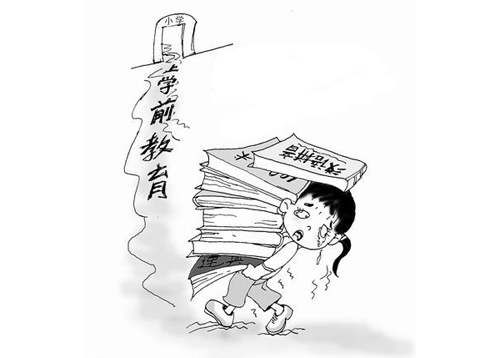
(Ecns.cn) -- Last month Wang Lei (not his real name) took his six-year-old daughter to register at a primary school in Beijing's Haidian district. Enrollment was not quite what he expected.
Wang thought the staff would only ask a few basic questions, yet a primary school teacher called his daughter into a classroom and interviewed her for nearly half an hour.
Wang's daughter came out sullen and mysteriously quiet. The teacher then informed him that his daughter knew nothing of Chinese phonetic transcription, basic Chinese characters or easy mathematics. The school might not enroll her at all.
Wang says he controlled his anger, but he was nonetheless confused. The things that the teacher pointed out were supposed to be taught in primary schools - why would his daughter have to learn them in advance?
Wang is not alone. Last month, a mother took her son to a primary school entrance examination in Shanghai. She was shocked: her son had to answer 200 questions covering various topics in one hour.
As expected, the result was not satisfactory; her son only answered about 100 of the questions. According to her, such examinations are very popular now, and most of the test contents are not what children should learn in kindergarten.
High pressure
In recent years many children in China have become wary of early childhood programs, with some even expressing fear of kindergartens. This is believed to be closely connected to current entrance requirements and teaching methods at primary schools.
More and more kids must take tough tests before they can enroll in key primary school classes, putting more pressure them, China Youth Daily reports.
With the number of baby boomers increasing rapidly in recent years, primary schools in China are receiving a larger number of applications from the parents of preschoolers. As a result, schools have introduced sometimes drastic testing methods to determine which students have the most potential.
Candidates may be challenged by questions designed for third grade students, for example. Not surprisingly, kindergarteners are now focusing more on academic studies long before they are even enrolled in primary school.
Ahead of the curve
To ensure a smooth transition from kindergarten to primary school, many parents have to force their children to take extra courses between the ages of five and six, says China Youth Daily.
Six-year-old Pen Peng, a kindergartener in Shanghai, has been taking training courses in Chinese, mathematics, fine arts, piano and taekwondo for several years. He now has a good mastery of 1,500 Chinese characters, Chinese phonetic transcription and basic mathematics.
Pen's mother is proud of him because his knowledge is equal to a third grader in primary school. He will very likely skip the first three years and begin at a fourth grade level when he enrolls.
However, according to his mother, Pen is not the most excellent student at his kindergarten: many children have taken English courses too.
For Wang Lei, who has chosen a different educational method for his daughter, the situation is less certain. He says children should participate in interesting activities - rather than intense academic studies - to inspire them to feel and explore.
Now, he admits the reality has shaken his determination.
To play or not to play
Primary schools that hold examinations to vet students are usually key schools in big cities that receive too many applications, according to China Youth Daily.
For example, Pen Peng's mother applied for a spot in a prominent primary school in Shanghai. That school received over 3,000 applications this year, but only enrolled 60 students.
Kang Jian, professor at the Graduate School of Education at Peking University, says he is worried about the situation: Children should be given first-hand experience to develop their interests and imagination, but not be forced to learn things that belong to the adult world, he says.
Preschoolers should be encouraged to develop their physical abilities because that is the most important requirement for their growth, adds Kang; playing is a very good way to achieve that goal.

Copyright ©1999-2011 Chinanews.com. All rights reserved.
Reproduction in whole or in part without permission is prohibited.